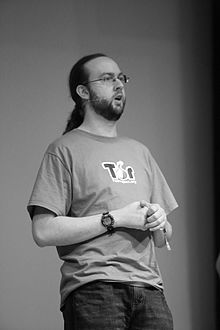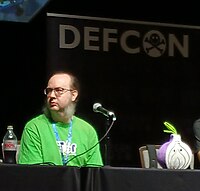| Roger Dingledine | |
|---|---|
 Dingledine in 2013 Dingledine in 2013 | |
| Born | Roger Dingledine United States |
| Other names | arma |
| Occupation(s) | Director and Research Director, the Tor Project |
| Known for | Co-Founding Tor and the Tor Project |
| Father | Raymond Dingledine |
Roger Dingledine is an American computer scientist known for having co-founded the Tor Project. A student of mathematics, computer science, and electrical engineering, Dingledine is also known by the pseudonym arma. As of December 2016, he continues in a leadership role with the Tor Project, as a project Leader, Director, and Research Director.
Education
Dingledine graduated from MIT with Bachelor of Science degrees in Mathematics and Computer Science and Engineering in 2000. He later obtained a Master of Engineering in Electrical Engineering and Computer Science from MIT.
Career
Tor Project
Tor was developed by Dingledine—with Nick Mathewson and Paul Syverson—under a contract from the United States Naval Research Laboratory. As of 2006, the software they developed was being distributed using proceeds from the Electronic Frontier Foundation, by the Tor Project. As described at the end of 2015,
The Tor Project develops and maintains ... The Tor Browser system, also known as The Onion Router ... a free, open source and sophisticated privacy tool that provides anonymity for web surfing and communication
as well as developing and maintaining other software tools and applications. As of December 2016, Dingledine continues in a leadership role with the Tor project, as a Project Leader, Director, and Research Director. Isabela Bagueros acts as the Tor project's Executive Director. She took over this role in January 2019, having previously been a Project Manager at the Tor project since 2015.

Publications and presentations
Dingledine has written several highly cited papers, including the Tor design paper titled Tor: The Second-Generation Onion Router, which won the Usenix Security "Test of Time" award. Other highly cited papers include Mixminion’s protocols for anonymous email, the Free Haven Project distributed anonymous storage service, various attacks and vulnerabilities related to anonymity technologies, and the economics and network effects of technologies for anonymity.
As an advocate for strong privacy, Dingledine is frequently invited to speak about security and privacy, including at academic conferences, the NSF (2014), the NSA (2007), and periodic interviews.
Awards and honors
Dingledine was named as one of the 2006 thirty-five Innovators Under 35 by MIT Technology Review, for his work on internet anonymization technologies through the Tor Project. The Review described the importance of the work in this way:
A dissident in China uses Web-based e-mail to contact a journalist in Canada. An intelligence agency wants to surveil a foreign website. Like every operation on the Internet, these activities leave tracks. Online anonymity measures provide a way around this problem; one of the most advanced is Tor, or the Onion Router. / Computer scientist Roger Dingledine developed Tor ...
In 2012, Dingledine and the other two initial developers of Tor, Nick Mathewson and Paul Syverson, were recognized by Foreign Policy magazine as #78 in their top 100 global thinkers.

Media attention
Dingledine has drawn attention after the leak of NSA documents by Edward Snowden, and public disclosure of the rules guiding the operation of XKeyscore, the NSA's collection system, given XKeyscore's targeting of Tor Project onion servers, including the one Dingledine runs at MIT, which serves a directory authority for the system, as well as being the base of operation of the Mixminion mail service, and host to various gaming and other websites (from which the NSA might be collecting IP addresses).
Further reading
- Roger Dingledine publications indexed by Google Scholar
- Goodin, Dan (2016-11-29). "Firefox 0-Day in the Wild is Being Used to Attack Tor Users". ArsTechnica. Retrieved 2016-01-04.
Publicly released exploit works reliably against a wide range of Firefox versions.
- Zetter, Kim (2015-12-11). "Tor Hires a New Leader to Help It Combat the War on Privacy" (print and online). Wired. Retrieved 2016-01-04.
- Zetter, Kim (2014-07-03). "The NSA Is Targeting Users of Privacy Services, Leaked Code Shows" (print and online). Wired. Retrieved 2016-01-04.
References
- ^ MIT Tech Rev Staff (2006). "Innovators Under 35: Roger Dingledine" (print and online). MIT Technology Review (September/October). Retrieved 2016-12-31.
- ^ "Roger Dingledine's Curriculum Vitae". freehaven.net. Retrieved 31 December 2016.
- "Tor Project: Core People". The Tor Project. Retrieved 2017-12-16.
- ^ "Tor Project: Core People". The Tor Project.
- "Robert Dingledine".
- Dingledine, Roger (2002-06-26). "Initial revision - svn:r2 - master tor-0.4.6.0-alpha-dev - debian-version-0.0.1+0.0.2pre19-1 - Roger Dingledine committed on Jun 26, 2002 - 1 parent 766a465 commit 9a928eeb1215f0d7c9b6d0bb9e4571d0a16ed79a Showing 67 changed files with 12,287 additions and 0 deletions". GitHub. Retrieved 2020-12-27.
- Zetter, Kim (2015-12-11). "Tor Hires a New Leader to Help It Combat the War on Privacy" (print and online). Wired. Retrieved 2016-01-04.
- As described by the MIT Technology Review at the time of the launch of the Tor Project, its function at the time was as follows. "To disguise Internet traffic's origins, Tor plots a route through any three of more than 700 volunteer-run Onion routers around the world. It sets up a two-way link between the sender's computer and the final router in the chain; data passed between them is encrypted in three layers, and each router in the chain peels off one layer along the way. Each data packet "remembers" only the address of the last router it visited. That way, even if the data is intercepted before the final router hands it off to the recipient, it's difficult to trace back to the sender." See MIT Tech Rev Staff, 2006, op. cit.
- "Announcing Tor's Next Executive Director: Isabela Bagueros". The Tor Project. 2018-04-23.
- Dingledine, Roger; Mathewson, Nick; Syverson, Paul (2004). "Tor: The Second-Generation Onion Router". Proceedings of the 13th USENIX Security Symposium.
{{cite journal}}: Cite journal requires|journal=(help) - USENIX Test of Time Awards. USENIX. Retrieved 2020-12-28.
- Danezis, George; Dingledine, Roger; Mathewson, Nick (2003-05-11). Mixminion: Design of a type III anonymous remailer protocol (PDF). 2003 Symposium on Security and Privacy. IEEE. pp. 2–15.
- Dingledine, Roger; Freedman, Michael; Molnar, David (2001). Free Haven Project: Distributed anonymous storage service. Designing Privacy Enhancing Technologies. Springer Berlin/Heidelberg. pp. 67–95. CiteSeerX 10.1.1.420.478.
- Serjantov, Andrei; Dingledine, Roger; Syverson, Paul (2003). "From a trickle to a flood: Active attacks on several mix types" (PDF). Information Hiding. Lecture Notes in Computer Science. Vol. 2578. Springer Berlin/Heidelberg. pp. 36–52. doi:10.1007/3-540-36415-3_3. ISBN 978-3-540-00421-9. Archived (PDF) from the original on April 19, 2021.
- Evans, Nathan S; Dingledine, Roger; Grothoff, Christian (2009-08-10). A Practical Congestion Attack on Tor Using Long Paths (PDF). USENIX Security Symposium. pp. 33–50.
- Acquisti, Alessandro; Dingledine, Roger; Syverson, Paul (2003). On the economics of anonymity (PDF). Financial Cryptography 2003. Springer Berlin/Heidelberg. pp. 84–102.
- Dingledine, Roger; Mathewson, Nick (2006-06-26). Anonymity Loves Company: Usability and the Network Effect (PDF). Workshop on the Economics of Information Security (WEIS).
- Dingledine, Roger; Wallach, Dan S. (2010-01-25). Building incentives into Tor (PDF). International Conference on Financial Cryptography and Data Security. Springer, Berlin, Heidelberg. pp. 238–256.
- Financial Cryptography and Data Security '10 - BEST PAPER AWARD: Roger Dingledine, The Tor Project, Tsuen-Wan Ngan, Dan Wallach. Building Incentives into Tor. Financial Cryptography and Data Security. 2010-01-25.
- Roger Dingledine (2014-01-14). "The Tor Project".
- "Talk by Roger Dingledine of Torproject.org at the NSA". Washington Post. 2013-10-04.
- Lamb-Hall, Malea (2020-08-03). "Roger Dingledine of Tor Project talks privacy and COVID-19 apps - A key figure at the heart of the debate around online privacy, Dingledine gives us his views on staying safe in the age of Covid".
- "Roger Dingledine - The Current and Future Tor Project. Updates from the Tor Project". FOSDEM 2019. 2019-02-02.
- "The FP Top 100 Global Thinkers". Foreign Policy. 2012-11-26.
- Zetter, Kim (2014-07-03). "The NSA Is Targeting Users of Privacy Services, Leaked Code Shows" (print and online). Wired. Retrieved 2016-01-04.